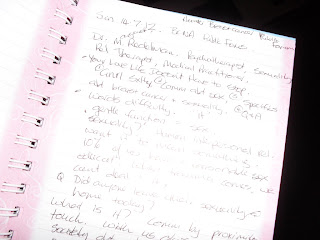Fallow deer, up close and personal. Their noses are soft like velvet as they sniff your hand for food.
Go froggie! This guy's about as big as a fist.

Mr Gibbon. He's quite shy, but very distinguished. Silvery gray body with a smart looking tuft of reddish hair above the eyes, and a fashionably curled beard of white. All very neat and sharp-looking.
This is a Golden Lion Tamarind - a small monkey with long, golden hair. About as big as a rabbit.
This is another Tamerind, and I refer to it as the 'gremlin' because it's got a white mo-hawk hair-do. It also has a really wierd little square face.
Meer cats.
You can pay to sit in certain cages and feed the animals. This couple are feeding the meer cats, and loving it.
Otters. They have such thick tails. We watched them rolling in the water, and foraging for their food. But here, they are enjoying the sun together.
These little guys were my favourite. Pygmy Marmosets. They are tiny little monkeys, no bigger than a rat. This one was very curious and came right up to the glass to check us out.
You can see the size of these little fellas. I so want one of these!
A snow leopard wasn't too comfortable with us being so close. A beautiful, elongated animal which preferred to be a bit further away.
We watched a couple of tigers displaying mating behaviour - snarling and groaning. This one was in the pen next door, and quietly cleaning himself.
I could not believe I was seeing this! A sort of "5-legged" Tapir. His 'relaxed' state was made even more unbelieving by the shape of the 5th leg - it had a funnel shape at the end and he was stepping on himself as he walked along!
Zebras.
Mogo Zoo is 10km south of Batemans Bay in NSW. It was a total delight to discover. The animals all looked healthy and happy.
















































